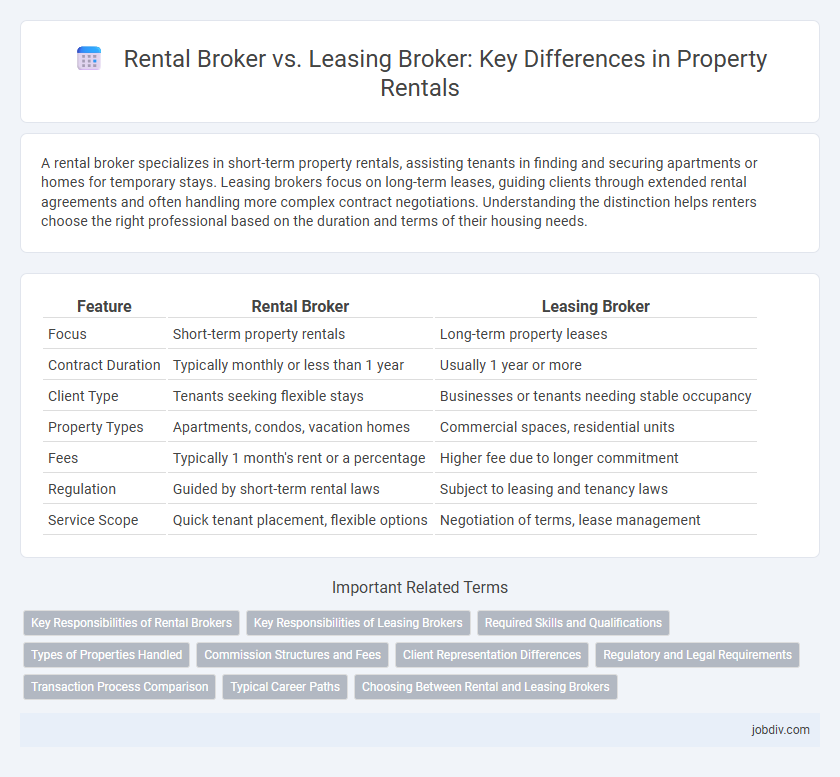A rental broker specializes in short-term property rentals, assisting tenants in finding and securing apartments or homes for temporary stays. Leasing brokers focus on long-term leases, guiding clients through extended rental agreements and often handling more complex contract negotiations. Understanding the distinction helps renters choose the right professional based on the duration and terms of their housing needs.
Table of Comparison
| Feature | Rental Broker | Leasing Broker |
|---|---|---|
| Focus | Short-term property rentals | Long-term property leases |
| Contract Duration | Typically monthly or less than 1 year | Usually 1 year or more |
| Client Type | Tenants seeking flexible stays | Businesses or tenants needing stable occupancy |
| Property Types | Apartments, condos, vacation homes | Commercial spaces, residential units |
| Fees | Typically 1 month's rent or a percentage | Higher fee due to longer commitment |
| Regulation | Guided by short-term rental laws | Subject to leasing and tenancy laws |
| Service Scope | Quick tenant placement, flexible options | Negotiation of terms, lease management |
Key Responsibilities of Rental Brokers
Rental brokers specialize in connecting tenants with suitable rental properties by assessing client needs, scheduling property viewings, and negotiating lease terms that align with market conditions. They maintain up-to-date knowledge of rental market trends and property availability, ensuring efficient matching of renters with landlords. Their key responsibilities also include facilitating communication between parties and assisting with rental application processes to secure lease agreements.
Key Responsibilities of Leasing Brokers
Leasing brokers specialize in negotiating lease terms, managing tenant-landlord relationships, and ensuring legal compliance with rental agreements. They coordinate property showings, assist clients in understanding lease conditions, and facilitate contract execution for long-term rental agreements. Their expertise helps both landlords and tenants achieve mutually beneficial leasing arrangements while minimizing disputes.
Required Skills and Qualifications
Rental brokers require strong communication skills, in-depth knowledge of local rental markets, and proficiency in negotiating lease terms to match tenants with suitable properties efficiently. Leasing brokers must possess expertise in property management, legal understanding of lease agreements, and skills in client relationship management to facilitate long-term rental contracts. Both roles demand licenses or certifications specific to real estate practices, along with abilities in market analysis and customer service.
Types of Properties Handled
Rental brokers typically specialize in residential properties such as apartments, single-family homes, and condominiums, helping tenants find suitable rental units. Leasing brokers often focus on commercial real estate, managing office spaces, retail stores, and industrial properties for businesses seeking long-term leases. Understanding the types of properties handled by each broker aids clients in selecting the right professional for their rental or leasing needs.
Commission Structures and Fees
Rental brokers typically earn commissions based on a percentage of the monthly rent, often ranging from 10% to 15%, which is paid by the landlord or tenant depending on the market. Leasing brokers, on the other hand, may charge a flat fee or a commission tied to the lease term value, incentivizing longer contracts and tenant retention. Understanding these commission structures and fees helps landlords and tenants choose the appropriate broker for their specific rental or leasing needs.
Client Representation Differences
Rental brokers primarily focus on short-term tenant needs, offering flexible lease agreements and quick turnover options, whereas leasing brokers specialize in long-term lease contracts and property management for clients seeking extended occupancy. Rental brokers typically represent tenants looking for temporary housing solutions, while leasing brokers often work closely with landlords to secure stable, long-duration tenants. Understanding these client representation differences helps tenants and landlords choose the right broker based on their specific rental requirements and lease commitments.
Regulatory and Legal Requirements
Rental brokers and leasing brokers operate under distinct regulatory frameworks that dictate licensing, disclosure obligations, and fiduciary duties. Rental brokers often face regulations centered on short-term tenant agreements, requiring compliance with local housing codes and tenant protection laws. Leasing brokers must adhere to more stringent statutory mandates involving long-term lease contracts, including mandatory lease disclosures and adherence to fair housing regulations.
Transaction Process Comparison
Rental brokers streamline tenant placement by securing short-term lease agreements and handling credit checks, while leasing brokers focus on long-term lease contracts and negotiating terms between landlords and tenants. The transaction process for rental brokers generally involves quicker tenant screening and faster turnaround times, whereas leasing brokers engage in detailed lease negotiations, documentation, and compliance verification. Efficiency in rental broker transactions suits temporary housing, whereas leasing brokers facilitate stability through comprehensive lease agreements.
Typical Career Paths
Rental brokers typically begin their careers by gaining experience in property management or client relations within the residential rental market, progressively advancing to higher commissions and specialized clientele. Leasing brokers often start with roles in commercial real estate firms or leasing agencies, focusing on negotiating lease agreements and building portfolios of commercial properties. Both career paths benefit from certifications such as Certified Leasing Specialist (CLS) or Certified Residential Specialist (CRS) to enhance credibility and advancement opportunities.
Choosing Between Rental and Leasing Brokers
Choosing between rental brokers and leasing brokers depends on the duration and terms of the property agreement; rental brokers specialize in short-term leases while leasing brokers handle long-term contracts. Rental brokers provide flexibility for tenants needing temporary accommodations, whereas leasing brokers focus on securing extended tenancy with more comprehensive agreements. Understanding these differences ensures selecting the right broker aligns with your housing needs and contractual preferences.
Rental Broker vs Leasing Broker Infographic

 jobdiv.com
jobdiv.com